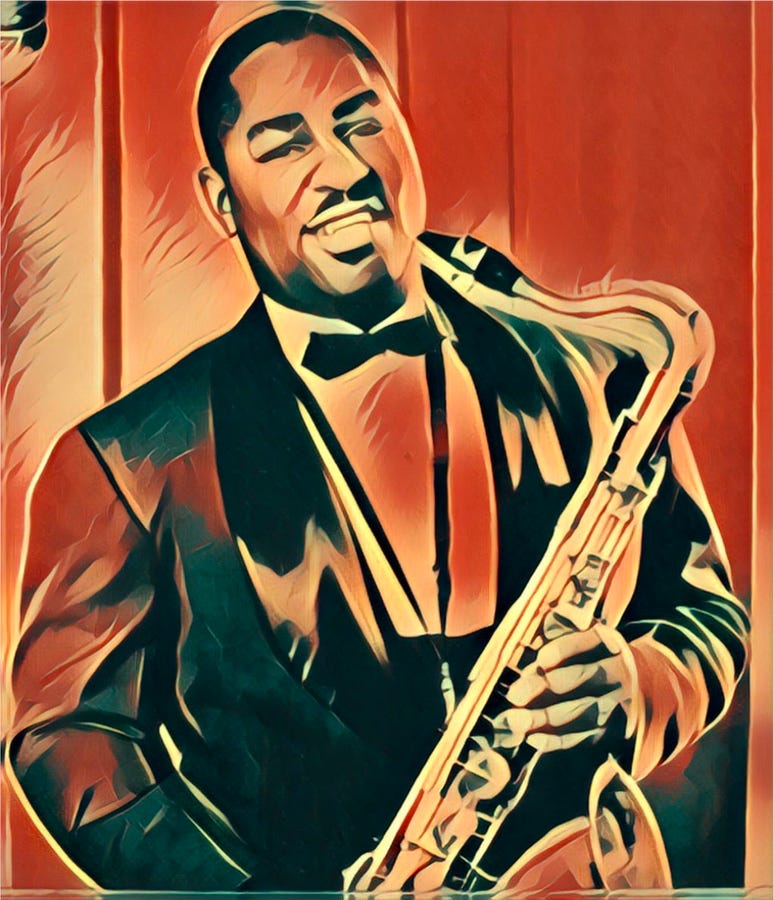Remembering Chu Berry
- Author
- Charles Bowen
- Published
- Fri 05 Sep 2025
- Episode Link
- https://1937flood.substack.com/p/remembering-chu-berry
The last time legendary Wheeling-born saxophonist Chu Berry was in the recording studio, he gave some jazz love to a song written by a fellow West Virginian.
The date was Aug. 28, 1941, and the tune — one of the four sides that Berry and his jazz ensemble would record that day for Milt Gabler's Commodore label in New York City’s Reeves Sound Studios on East 44th Street — was “Gee, Baby, Ain't I Good to You.”
The song was still relatively unknown. No one else had recorded it in the dozen years since Piedmont, WV, native Don Redmond wrote it for McKinney's Cotton Pickers to wax in 1929.
As discussed here in an earlier article, the Roarin’ Twenties has been good for Don Redman. He was responsible for integrating the rhythmic approach of Louis Armstrong’s playing into arrangements for Fletcher Henderson’s Orchestra. In 1927 Redman was wooed away from Henderson to join McKinney’s Cotton Pickers, the house band at the celebrated Greystone Ballroom in Detroit.
When Chu Berry revisited the song in 1941 (to be on the flip side of his version of "Sunny Side of the Street”), it featured ex-Bennie Moten/Count Basie trumpeter Oran “Hot Lips” Page, whose bluesy singing and plunger mute work capped the session.
Incidentally, Page recorded it again in 1944, but even more importantly for the song’s legacy (and to Don Redmond’s checkbook) a year earlier the song was also recorded by an up-and-comer named Nat “King” Cole, who took it to No. 1 on the Billboard Harlem Hit Parade where stayed for four weeks.
Losing Chu
Chu Berry would not live to know any of that.
Almost exactly two months after the August 1941 recording date, he was on his way to Toronto for a gig with the Cab Calloway Orchestra, with which he had played for four years. Heavy fog made visibility poor, and the car in which Chu was a passenger skidded and crashed into a bridge abutment near Conneaut, Ohio, 70 miles northeast of Cleveland.
Berry died three days later from his injuries just a few weeks after his 33rd birthday.
Chu Berry was brought back to Wheeling for his funeral. More than a thousand mourners attended, including Cab Calloway and the members of his band who ordered a massive floral arrangement in the shape of a heart.
At the funeral, Calloway told mourners Chu had been like a brother to him. The big man had charmed the world, he said, with advanced harmonies and smoothly flowing solos that would influence musicians for generations to come. “Chu will always be a member of our band,” Cab said. “He was the greatest.”
Berry’s Roots
Born in Wheeling in 1908, Leon Brown Berry took up the saxophone as a youngster after being inspired by the great tenor man Coleman Hawkins. Berry went on to model his own playing after Hawkins, who would later be quoted as saying, “Chu was about the best.”
By the time of his 27th birthday, Chu had moved to New York where he worked with Bessie Smith, Lionel Hampton, Count Basie and others.
Eventually, he became the featured sax player with the hottest jazz band of the day, Cab Calloway’s legendary Cotton Club Orchestra. In 1937 and 1938, he was named to Metronome Magazine’s All-Star Band.
Younger contemporaries — notably Charlie Parker and Dizzy Gillespie — almost certainly heard Berry up close and personal at the now-legendary Monday night jam sessions at Minton’s Playhouse in New York City, gatherings widely credited for the development of the bebop in the mid-1940s.
Famously, in 1938 Parker — 14 years younger than Chu — named his first child Leon in tribute to Berry.
And the Nickname?
Multiple explanations have been given as to how Leon Berry got his nickname. Music critic Gary Giddins has said Berry was called “Chu” by his fellow musicians either because of his tendency to chew on his mouthpiece or because at one time he had a Fu Manchu-style mustache. Both stories work; take your pick.
Our Take on the Tune
Joining The Flood repertoire, some songs fit in right away, while others, like this one, need a little time to settle in, but when they do, wow — they’re as comfortable as an old shoe.
This is a public episode. If you would like to discuss this with other subscribers or get access to bonus episodes, visit 1937flood.substack.com
